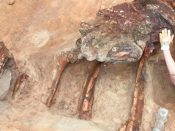Por Helena Gaspar (BioISI/FCUL).
New Psychoactive Substances (NPS) are a range of substances, mostly synthetic, that have emerged in the recreational drugs market with the purpose of mimicking the effects of classic drugs and circumvent legislation restrictions against illicit substances. The term NPS designates substances of abuse, that are not controlled by the United Nations Drug Conventions, but which may pose a public health threat comparable to substances present in these conventions. However, the health risks associated with the consumption of NPS led to the publication of new legislation in different countries, aiming to overcome the concerns related to these risks. One of the main challenges in the early control of NPS, either in seized material or biological matrices, is related to their correct identification using reliable and rapid analytical methods, even in the absence of standards.
To tackle the problem of accurate and unambiguous identification of NPS in Portugal, a collaboration was established between the Faculdade de Ciências da Universidade de Lisboa, Laboratório de Polícia Científica da Polícia Judiciária (LPC/PJ) and Instituto Nacional de Medicina Legal e Ciências Forenses, I.P. (INMLCF). Between 2014 and 2022, working on 103 selected cases chosen by the LPC/PJ, a methodology was developed using complementary information gathered from different analytical techniques, allowing not only an unequivocal identification (without standards) of 122 NPS in seized products, but also the use of some samples as qualitative standards in routine analyses. Twenty-six NPS were detected for the first time in Portugal (4F-PBP for the first time in Europe), being synthetic cathinones the major class of the NPS detected. These NPS, are β-keto phenethylamines, structural analogues of cathinone, the major psychoactive alkaloid present in the leaves of Catha edulis. Notably 65% of the material seized (3.3 tonnes) during 2020 in Europe was cathinone powders, and until December of 2021, 162 cathinones were reported as NPS. The increase of acute intoxication and deaths associated with the consumption of cathinones (and other NPS) has resulted in their continuous inclusion in the International Drug Control Convention. Since 2015, 12 synthetic cathinones were included in the Schedule II of the Convention on Psychotropic Substances of 1971.
In this context, a series of cathinones already in the market, or with foreseeable structural modifications to render them NPS, were synthesized and fully characterized. The obtention of these cathinones standards allowed: i) to create a GC–MS and NMR library that has facilitated the rapid and straightforward identification of cathinones in seized products in Portugal; ii) to develop analytical methodologies for the differentiation of regioisomeric cathinones (e.g. by FT-ICR) iii) to develop and validate methods for a rapid and unambiguous monitoring of cathinones in blood by SPE/GC-MS; iv) to evaluate the cytotoxicity of cathinones in human cell lines (SH-SY5Y and HepG2); v) to discover the selective biomarkers for detection of cathinones in biological matrices through the study of their metabolic profile by LC-HRMS/MS generated by incubation in human liver microsomes. Subsequently, the metabolites considered to be used as biomarkers were synthesized and their cytotoxicity evaluated.
These findings represent an important contribute not only for the unequivocal identifications of these emerging cathinones in seized product and biological matrices but also to understand their potential adverse effects and link causative agents to toxicities.




















